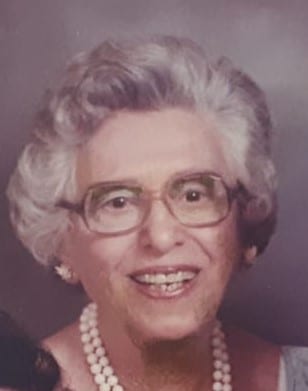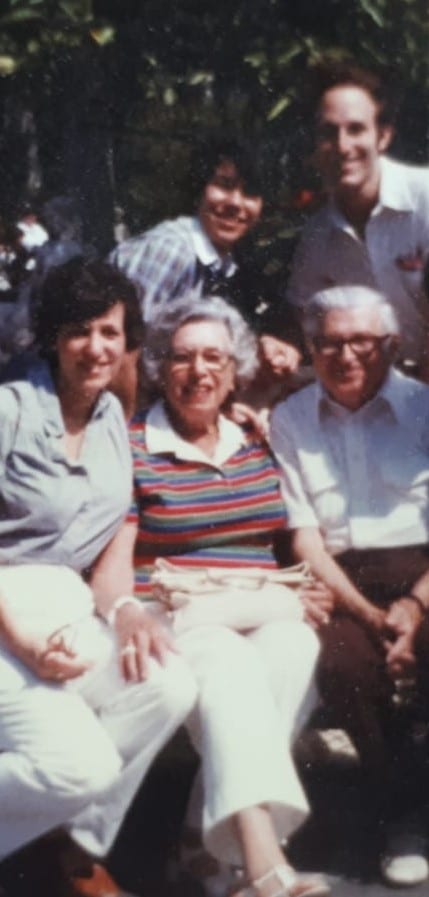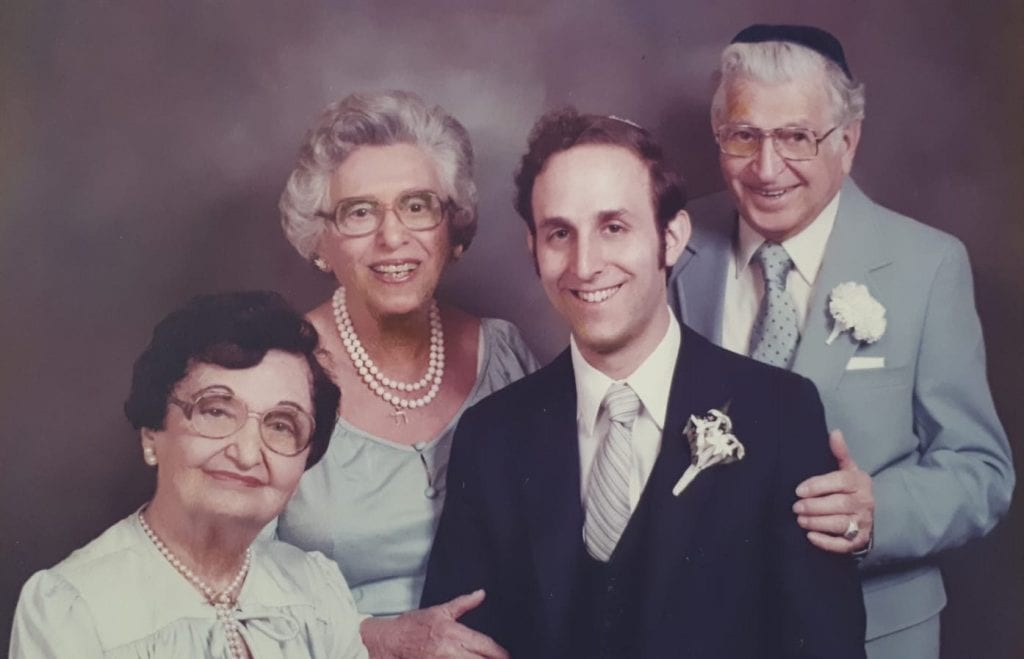Working Hard and Succeeding


Herb Rosen interviewed his parents, Louis H. Rosen & Fanny (Tannenbaum) Rosen, in their apartment in Clearwater, Florida, in March 1978
Herb: We thought this would be an excellent opportunity to begin the family tree of the Rosens and the Tannenbaums and see what life was like during their very early ages. Later we will talk about more extensive subjects and their adolescence and early adulthood. But tonight we’ll limit ourselves to childhood and very early reminisces. I’d like to ask you about some of her your recollections in Chicago, you were born. Do you remember your home? Can you describe it at all?
Yes. We lived on Barber Street in Chicago. That’s near Jefferson. And my grandmother would sell Russian things. She lived on Union street. Both streets are still there and we used to, well, I would sell at a store, a grocery store, in Brighton Park. And it so happened that my dad’s brother was in from New York at that particular time and he went out with us to Brighton Park and we bought the store.
We got the store from a woman by the name of Mrs. Brofsky, who just couldn’t make a go of it. But my mother said she didn’t worry about that. She would be able to handle that part of it.
– What kind of a store was it?
A grocery store.
– How big was the store? Just curious.
Oh, it is still there. I’ll take you out there the next time I come to Chicago and show it to you. And even show where Uncle Haimy (?) made out of a house a synagogue because there were quite a few Jewish people. It was considered a Polish neighborhood. I went to school there. And of course there were no sewers there. The toilets were in the backyard. Outhouses. We had ditches in the front. And the kids used to have an awful good time you know. The minute you’d get angry at somebody that had this one easy thing – you wouldn’t have to hit him with a fist you would throw him the ditch. Everybody was throwing my brother Al in the ditch and I went fighting after them. And I would throw all of them in the ditch. It so happened when they saw me they said “here she comes, let’s get away!”
– Can you describe your early schooling?
Yes. I went to the NS Davis School it was called. It was on Union and Jefferson. I went there for quite a while and then the folks moved a bit further away I was transferred to another school. But in this school it so happened that in third grade I got a very bad teacher. And I was, I used to like to go out in recess time and buy candy and eat it. I never could finish it until I got back in the room. So I’d get back and I would start chewing it and the teacher got very angry at me. And one day she got me up in the front of the room and she said “you just stand here and I’m going to have all the children laugh at you”. I said “oh no you won’t.” and I left. I came home and told my dad about it and he came to the school with me and he had quite a fight with the teacher. He called her an “anti-Semite (pronounced anti semit) Yes, he said you’re a real “anti semit”.
– That sounds like John.
Yes! But finally they couldn’t do anything. Because she said she wouldn’t do anything until I got back in the room until I stood in front of the room and ate the candy and had the kids laugh. I said “I’m sorry I won’t do it”. So I was suspended out of the school. And then I went to, there was a Jewish training school, a little further and I had to tell them a different address, I gave them my grandmother’s address who lived on Union street. I said I live with my grandmother and they took me there until somebody said she belongs to the other school but she was fired out of it. You know. So I went back but I didn’t go back to that school. I wouldn’t go back.
– Can you describe your mother to us? My grandmother?
She was beautiful. She was just beautiful.
– I know she basically ran the grocery store.
Yeah, that will tell you about that. When we got to Brighton Park and she owned that store, and that woman Mrs. Brofsky – we had to pay her rent – says “you’ll never make it”. And she says “don’t worry, we’ll make it”. She said I heard what you do. She says when you’re weighing cookies and the scale balances over a little bit you take and break the cookie in half. I won’t do that. I’ll let the customer get the other half.
– That’s being a good business woman. I remember you told me how you would get bread. That you had to go to the bakery. Please describe that.
Oh yeah. There weren’t any deliveries that would come out to Brighton Park. First of all because there were ditches. Second the valley was all mud and then if it rained and then dried out it was too hard for them to come. So we had to pick up all our stuff. Nobody would deliver anything. So I used to come after school. I went to Jefferson and Union. I would go and get the bread from Walfer’s bakery. I used to get these big rye breads. Each bread weighed two and a half pounds. And they were round and they were this really heavy rye, you know. They were delicious. They would pack up four loafs on each side. So I would have four and four. And they would put a wooden handle on it so I could get back on the streetcar. I would have to take the … streetcar and then transfer on Archer. And then Archer would take me to 38th street. Because our grocery was on 38th street and Archer. Near Brighton Park.
My mother would cut the bread into quarters. She would give more than a quarter because I couldn’t bring more than eight loaves and she wanted to divide the bread between all the customers. And they used to stand and wait for me to come with the bread already. Because they couldn’t wait. The bread was so good.
They did tremendously well in the store. Very good. It was a Polish trade and she could speak good Polish and my dad could speak good Polish so it was easy. It was all Polish workers there. And she was doing real good so this owner Mrs. Brofsky she was doing so good so she says she wants the store back again, she wants my mother to sell back the store. So my mother sold her back the store and then we had to start looking for another store. So we went and looked on York and Hermitage near the County Hospital. And my mother had seen a house there. It was two floors. So we took, I think there was 8 rooms upstairs and I think there were 6 rooms downstairs. So out of the first front part she made the store. They had one room in the back with a bedroom so in case anybody got sick or something they’d be close, and they can handle that too. Otherwise we’d go upstairs to sleep. She would run the store all day long and my dad used to sit there and criticize it. That she’s too good to her customers, that she gives them too much attention, that you’re too good. She says well, she’d always say, you can only get honey with flies. The more honey you put out the more flies you get. She used to say that. So when we got to York and Hermitage she saw this corner and building and she rented it. It was HL Stone, real estate people. I believe they are still in business, in Chicago.
One day she says if only I could put up a big glass instead of having two windows there. A big glass to make it really look like a grocery store. She had to get permission from HL Stone. So I went with her. We talked to him and he says it’s okay, you can do it. We got permission, he wrote to Stone who was in New York at the particular time and we did that. She says you know it would be a good idea if we could buy the building, because it is a good corner, it will be good anytime. Even if I don’t want it as a grocery store. So I went with her to HL Stone and company, we start talking and my mother says to him “write to Stone and tell them that I want to buy the building. And he delayed it and delayed it and delayed it and finally he sold us the building. He sold us the building and then we took the upstairs apartment. That is we had four rooms. There were eight rooms but we took four and then four we rented. So she got rent out of that. For about a year and a half we heard a rumor that a contagious hospital was going to buy up a lot of the buildings around there and they were all tree flat buildings. They were going to buy up the buildings and make a contagious hospital. So my mother says that’s not for me. That’ll kill my business. So she started talking to the breadman who delivered bread and anyone who delivered anything. She says I’m getting tired, I want to sell. I’ll sell the building and the business and everything. And I want just five thousand dollars for the key. That’s all. So my dad would say to her “$5,000 for the key? Aren’t you glad just to sell it?” and she says: “I can ask, what do I have to lose?” She said. I’ll ask. Maybe I’ll get something. Anyway she sold it and got $45,000 for it.
We moved and then the same thing – we opened another store, like that. They had a grocery there and we lived upstairs of that grocery store. She ran the grocery there. Ran it for a couple of years, did very well. In fact Al and Pearl graduated school in that neighborhood there and then they went to Matill high school from there. The kids were growing up and then later on I started going to work.
– I understand that you did much of the chores since your mother was working. You did the laundry how did you the laundry?
Oh the laundry I did when I went to school. I always did the laundry in Brighton Park
– Did you have an electric washer?
No! On a washboard. And then I used to hang it outside. Before I went to school I did that. I’d hang it on a line outside in the yard.
– How did you heat the water?
On a big kettle. We had one of these big kettles. Like they used to boil clothes in it. It was very difficult.
– Who did the cooking?
My mother did. She was a very good cook. Dad will tell you that. He raved about her cooking. She was a cook. Every Saturday we would always have homemade challah. She always made it, gefilte fish, chicken soup with kneidlach. Every Saturday. She would always bake a pretzel and put onions on it. And she when it got hot she would take it out hot from the oven and put garlic on it. We used to stand in line to get it. It was so good. We used to look forward to that.
– Mother, Can you describe your first job? Do you remember what year it was? How old were you?
I was 12 years old. It was during summer vacation and they wouldn’t hire me unless I was 16. So I got a girlfriend of mine – she didn’t have to work – so she got a certificate and I used her name. So I wasn’t Fanny Tannenbaum then, I was whatever name, and I had to worry about that I would forget myself. I worked at the Boston store, for $2.50 a week.
And the saleslady would give me the slip material and whatever merchandise she happened to have, and I would bring it over to the cashier. The cashier would give me the cash and wrap it up and then I would bring it back to her. Really I was an air go between the cashier and the salesperson.
Then of course I went back to school. During another summer vacation I worked as a wrapper. I used to wrap. Then I got 6$ a week. I worked from 12 until I graduated from school.
After that – I started to.. Oh yes, my mother wanted me to take up shorthand. I took that up. At business college. In South Chicago, that’s where I went.
– Earlier today you mentioned your first job, where you lasted 3 weeks?
Yes, I went out and got a job at an electrical place on Washington Blvd. I couldn’t stand it, I couldn’t stand the hours, and I wasn’t good at spelling so it made it even more difficult. I was good in taking shorthand, but then when it came to putting it on the typewriter I wasn’t too fast. For $6 a week they wanted it real fast.
Well, I’ll go over to the Boston Store and see what they have to offer. They gave me a job as a saleslady on the main floor they had a boot, or a table, with ribbons, yard length, the ends of the bowls. The first week I made $18. So I wasn’t going to go back for the $6.
I didn’t quit my stenographic job. Oh no. I just called up and said I was sick. And I didn’t tell my mother since I knew she would feel terrible. She wanted me to work in an office. Didn’t want me to be a saleslady, so I didn’t say anything to her. But after I worked for a week at – I think the company’s name was Arwin or something – the stenographer, I got my $6, and I came home and said: “Look mom, $6 I worked a whole week for. I didn’t say anything. Later when I worked in the Boston store and I got $18, she said: “Ok, if that is what you want. That makes you happy – do it. Stay there”. Then I called up and quit.
– You described earlier how you decided to leave the aisle and booth because people were pushing you?
Then I went to the superintendent because I couldn’t stand being out there on the aisle and everyone was passing down there on the main floor. I was getting bumped up. So I went to Mr. O’Sullivan who was the superintendent of the hiring. I told him I’m getting bumped around and I just can’t take it, maybe you could transfer me somewhere else. He said, 03 I’ll do that for you. He put me in a different department.
– I hope “03” was a name of endearment was it?
I don’t know what it was but he always called me “03”. He kept saying all the time, you can always come back to me. “Well I like you!”
Anyhow, so he put me in another department. I was doing well. But I didn’t like the buyer. She was very fresh, tossed you around like you were nobody and she was dressed to kill. You would love to see her the way she dressed. But I just didn’t want any part of her. So I went down again.
He says “what department do you want?” I said “I would like the lady’s handbags. I think I would like that very much”. So he talked to the buyer there, who was a Polish man, and a very nice man, and they put me behind the leather goods. I worked was there for quite a little while
Picture from grandson Barry's wedding, July 5th, 1982. From left: Blanche (Blume) Lippitz, Fanny Rosen, Barry Rosen, Lou Rosen
Audio recording of the interview: Lou and Fan Rosen, 3-1-78
הזוית האישית
It was amazing to discover this interview that my grandfather held with my great grandparents. It was extremely moving to be able to hear their voices and listen to them tell about their experiences – and to hear this firsthand account of her childhood in the US.
מילון
stenographythe art of rapid handwriting
ציטוטים
”I was 12 years old when I got my first job“






